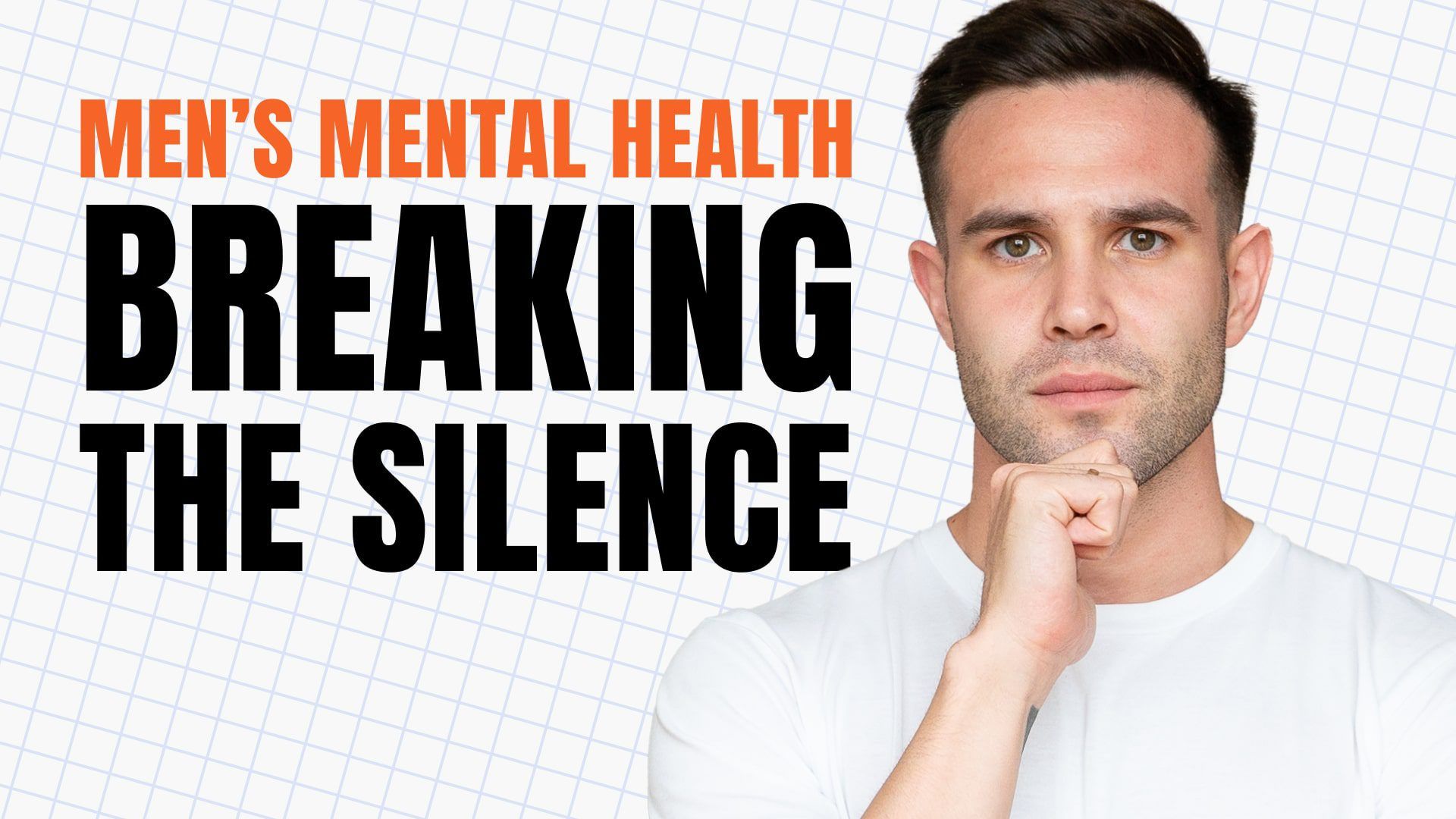Optimizing Men’s Performance: Health, Fitness, and Productivity

Table of contents
In this article, you will learn…
Optimizing your performance in all areas of life requires a balanced approach that integrates physical fitness, proper nutrition, adequate sleep, stress management, and effective time management.
By focusing on these key areas, you can enhance your mental clarity, increase your energy levels, and boost your overall productivity.
This guide will walk you through the strategies needed to improve your performance holistically, offering actionable advice that you can start implementing today.
Whether you’re looking to excel in your career, improve your physical health, or simply manage your daily tasks more efficiently, understanding the connection between these aspects of your life is crucial.
Don’t like to read? Watch the video
Key Takeaways
- Physical fitness: Regular exercise is essential for enhancing mental focus, energy levels, and overall productivity.
- Nutrition: A balanced diet fuels cognitive function and provides sustained energy throughout the day.
- Sleep: Quality sleep is crucial for maintaining cognitive performance, emotional resilience, and physical health.
- Stress management: Effective stress management techniques can improve focus and prevent burnout, leading to better performance.
- Time management: Strategic time management enhances productivity without sacrificing health, ensuring a balanced and fulfilling life.
Physical Fitness: The Foundation of High Performance
The Cognitive Benefits of Regular Exercise
Regular physical activity is not just about staying in shape; it’s also critical for maintaining and enhancing cognitive functions such as memory, concentration, and decision-making.
Exercise increases blood flow to the brain, which helps improve mental clarity and focus.
Additionally, physical activity releases endorphins, the body’s natural mood boosters, which reduce stress and anxiety, leading to better overall performance.
Mental Focus and Clarity:
- Enhanced Memory and Learning: Aerobic exercises like running, swimming, and cycling are particularly effective at improving brain function, helping with memory retention and faster learning.
- Improved Decision-Making: Regular exercise has been shown to enhance executive function, allowing for quicker and more effective decision-making, which is crucial in both professional and personal settings.
Designing an Effective Workout Routine
To maximize the cognitive and physical benefits of exercise, it’s important to design a workout routine that includes a balance of different types of exercises.
This not only supports overall fitness but also ensures that all aspects of physical and mental performance are optimized.
Balancing Cardio and Strength Training:
- Cardio: Incorporate at least 150 minutes of moderate-intensity cardio each week. Activities like running, brisk walking, or cycling improve cardiovascular health and enhance endurance.
- Strength Training: Include strength training exercises at least two days a week. Focus on compound movements like squats, deadlifts, and bench presses, which engage multiple muscle groups and support overall strength and stability.
Incorporating Flexibility and Mobility Exercises:
- Flexibility: Add stretching exercises or yoga to your routine to improve flexibility, which helps prevent injuries and maintain a full range of motion.
- Mobility: Engage in mobility exercises that enhance joint health and reduce the risk of injuries, particularly important for maintaining long-term physical performance.
Nutrition: Fueling Your Body and Mind
Eating for Cognitive Function and Sustained Energy
Nutrition plays a crucial role in optimizing both physical and mental performance. The right foods can fuel your brain, keep your energy levels stable, and prevent the midday slumps that hinder productivity.
Key Nutrients for Brain Health:
- Omega-3 Fatty Acids: Found in fish, flaxseeds, and walnuts, omega-3s are essential for brain health and cognitive function. They help maintain the structure of brain cells and improve communication between them.
- Antioxidants: Foods rich in antioxidants, such as berries, dark chocolate, and leafy greens, protect brain cells from oxidative stress and support overall brain function.
- Vitamins: B vitamins, particularly B6, B12, and folate, are crucial for brain health, supporting memory, focus, and energy levels.
Balancing Macronutrients:
- Proteins: Essential for muscle repair and growth, as well as maintaining a steady supply of energy throughout the day. Include lean meats, eggs, and plant-based proteins like beans and lentils in your meals.
- Complex Carbohydrates: Provide a slow release of energy, helping to maintain stable blood sugar levels. Opt for whole grains, oats, and sweet potatoes instead of simple carbs like sugary snacks and white bread.
- Healthy Fats: Support brain health and provide long-lasting energy. Include avocados, nuts, seeds, and olive oil in your diet.
Meal Planning for Peak Performance
Planning your meals strategically can help you maintain consistent energy levels and mental clarity throughout the day, which is essential for sustaining productivity.
Pre-Work and Post-Work Meals:
- Pre-Work: Start your day with a balanced breakfast that includes protein, complex carbs, and healthy fats. A meal like oatmeal with nuts and berries or eggs with whole-grain toast can fuel your morning activities.
- Post-Work: After work or a workout, focus on meals that help with recovery and sustained energy. A combination of lean protein, vegetables, and whole grains is ideal for dinner.
The Role of Hydration:
- Cognitive Function: Staying hydrated is essential for cognitive performance. Even mild dehydration can impair concentration, memory, and mood.
- Productivity: Drink water regularly throughout the day. Aim for about 8 glasses (2 liters) per day, but adjust based on activity level and climate.
Sleep: The Underestimated Performance Enhancer
The Critical Role of Sleep in Cognitive and Physical Performance
Sleep is often overlooked in discussions about productivity, but it is one of the most critical factors in maintaining both cognitive and physical performance.
During sleep, your brain consolidates memories, processes information, and clears out toxins that accumulate during the day.
Without adequate sleep, these processes are disrupted, leading to impaired memory, reduced focus, and poor decision-making.
Sleep and Productivity:
- Improved Memory and Learning: Sleep is essential for memory consolidation, which helps you retain information and learn new skills more effectively.
- Enhanced Decision-Making: A good night’s sleep improves cognitive function, making you more capable of making clear, well-reasoned decisions throughout the day.
Sleep Deprivation Risks:
The risks of sleep deprivation extend beyond just feeling tired. Chronic sleep deprivation can lead to serious health issues, including an increased risk of cardiovascular disease, diabetes, and mental health disorders. Additionally, lack of sleep can severely impair your ability to concentrate, leading to decreased productivity and a higher likelihood of making mistakes.
Negative Impacts of Sleep Deprivation:
- Reduced Cognitive Function: Lack of sleep affects your ability to think clearly, solve problems, and focus on tasks.
- Emotional Instability: Sleep deprivation can lead to increased irritability, mood swings, and difficulty managing stress.
- Physical Health Risks: Chronic sleep deprivation is linked to a higher risk of developing chronic conditions like hypertension, obesity, and diabetes.
Strategies for Improving Sleep Quality
To optimize performance, it’s essential to prioritize sleep and ensure you’re getting enough quality rest each night. Implementing strategies to improve your sleep can have a profound impact on your overall productivity and well-being.
Establishing a Sleep Routine:
- Consistent Sleep Schedule: Go to bed and wake up at the same time every day, even on weekends. This helps regulate your body’s internal clock and improves the quality of your sleep.
- Wind-Down Routine: Develop a relaxing pre-sleep routine that signals to your body that it’s time to wind down. This could include activities like reading, taking a warm bath, or practicing relaxation exercises.
Creating a Sleep-Conducive Environment:
- Dark and Quiet Room: Ensure your bedroom is dark, quiet, and cool. Consider using blackout curtains, earplugs, or a white noise machine to create an ideal sleep environment.
- Comfortable Bedding: Invest in a comfortable mattress and pillows that support your preferred sleep position. Your bed should be a place of comfort that promotes restful sleep.
- Limit Screen Time: Reduce exposure to screens (phones, tablets, TVs) at least an hour before bed, as the blue light emitted can interfere with your body’s production of melatonin, a hormone that regulates sleep.
Stress Management: Maintaining Balance for Optimal Performanc
Understanding Eustress vs. Distress
Stress is a natural part of life, but not all stress is detrimental. In fact, moderate levels of stress, known as eustress, can be beneficial by enhancing focus, motivation, and performance.
However, when stress becomes overwhelming, it can lead to distress, which negatively impacts both your mental and physical health.
Harnessing Positive Stress:
- Eustress as a Motivator: Eustress can push you to meet deadlines, achieve goals, and perform at your best. It’s the kind of stress that keeps you alert and engaged without overwhelming you.
- Balance is Key: The goal is to find the right balance where stress motivates you without tipping into distress. Recognizing when stress levels are becoming counterproductive is crucial for maintaining optimal performance.
Recognizing and Reducing Negative Stress
When stress becomes chronic or overwhelming, it can lead to burnout, anxiety, and other health problems. Recognizing the signs of distress early and implementing strategies to reduce stress is essential for sustaining long-term productivity.
Signs of Negative Stress:
- Physical Symptoms: Headaches, muscle tension, fatigue, and sleep disturbances are common physical signs of excessive stress.
- Emotional Symptoms: Increased irritability, anxiety, and feelings of being overwhelmed are indicators that stress may be negatively impacting your mental health.
- Cognitive Symptoms: Difficulty concentrating, forgetfulness, and indecision can signal that stress is affecting your cognitive function.
Techniques to Manage Stress:
- Mindfulness Practices: Incorporating mindfulness techniques such as meditation, deep breathing exercises, or yoga into your daily routine can help reduce stress levels and improve focus.
- Regular Breaks: Taking short, regular breaks throughout the day helps maintain mental clarity and prevents burnout. Even a brief walk or a few minutes of stretching can rejuvenate your mind and body.
- Time Management: Effective time management can help reduce stress by ensuring that tasks are completed efficiently, leaving time for relaxation and self-care.
Time Management: Enhancing Productivity Without Sacrificing Health
Effective Time Management Strategies
Time management is crucial for maximizing productivity while maintaining a healthy balance between work and personal life. By organizing your time effectively, you can reduce stress, accomplish more, and ensure that you’re not sacrificing your health in the process.
Prioritization and Goal Setting:
- Set Clear Priorities: Start by identifying your most important tasks for the day, week, or month. Focus on high-impact activities that align with your long-term goals.
- SMART Goals: Use the SMART (Specific, Measurable, Achievable, Relevant, Time-bound) framework to set realistic and attainable goals. This helps ensure that your goals are clear and trackable, making it easier to stay focused and motivated.
- Daily To-Do List: Create a daily to-do list that includes your top priorities. Break larger tasks into smaller, manageable steps to prevent feeling overwhelmed.
Avoiding Multitasking:
- Focus on One Task at a Time: Research shows that multitasking can reduce productivity and increase errors. Instead, concentrate on one task at a time, giving it your full attention before moving on to the next.
- Time Blocking: Use time blocking to allocate specific periods during the day for focused work on particular tasks. This method helps reduce distractions and improves efficiency.
Balancing Work and Personal Life
Achieving a balance between work and personal life is essential for maintaining overall well-being. By setting boundaries and incorporating health-focused activities into your schedule, you can ensure that both your professional and personal needs are met.
Setting Boundaries:
- Work-Life Separation: Establish clear boundaries between work and personal time. This might mean setting specific work hours and sticking to them, or designating certain spaces in your home as work-free zones.
- Learn to Say No: Protect your time and energy by learning to say no to non-essential tasks or commitments that don’t align with your priorities.
Incorporating Health into Your Schedule:
- Schedule Exercise: Make exercise a non-negotiable part of your daily routine. Whether it’s a morning jog, a lunchtime yoga session, or an evening workout, scheduling it ensures that it remains a priority.
- Meal Prep: Dedicate time during the week to plan and prepare healthy meals. This not only saves time but also ensures that you’re nourishing your body with the right nutrients to support sustained energy and focus.
- Mindful Breaks: Incorporate short breaks throughout your day to stretch, breathe deeply, or simply step away from your work. These breaks help prevent burnout and maintain mental clarity.
Frequently Asked Questions
What are the key signs that I need to adjust my current routine to improve performance?
If you notice persistent fatigue, difficulty concentrating, frequent mood swings, or a decline in physical performance, it might be time to reassess your routine.
These symptoms can indicate that your body and mind are not getting the support they need.
Overtraining, poor nutrition, inadequate sleep, and unmanaged stress are common culprits.
Regularly evaluating your routine and making adjustments based on your current needs can help optimize performance and prevent burnout.
How can I incorporate healthy habits into a busy schedule?
Incorporating healthy habits into a busy schedule requires planning and prioritization.
Start by identifying small, manageable changes you can make, such as adding a 10-minute walk during lunch breaks or preparing healthy meals in advance.
Use time management tools like calendars or apps to schedule these activities just as you would with work tasks.
Remember, consistency is more important than intensity when building new habits. Even small changes, when done regularly, can lead to significant improvements over time.
What role does mental health play in overall productivity, and how can I improve it?
Mental health is a critical component of overall productivity.
When your mental health is compromised, it can lead to decreased focus, motivation, and energy levels, all of which negatively impact performance.
To improve mental health, incorporate practices such as mindfulness, meditation, and regular physical activity into your routine.
Ensuring you have a support network, maintaining a healthy work-life balance, and seeking professional help when needed are also important steps in supporting mental well-being and enhancing productivity.
How do I stay motivated to maintain a healthy lifestyle long-term?
Staying motivated over the long term requires setting realistic goals, celebrating small victories, and continuously reminding yourself of the benefits of a healthy lifestyle.
Finding activities you enjoy, whether it’s a particular form of exercise or cooking healthy meals, can make the process more enjoyable. It’s also helpful to connect with a community or find a workout partner for accountability and support.
Remember, motivation can fluctuate, so developing discipline and making healthy habits a non-negotiable part of your routine will help sustain your efforts.
How can I prevent burnout while striving for high performance?
Preventing burnout involves balancing your ambitions with adequate rest and recovery.
This includes not only getting enough sleep but also taking regular breaks during the day, scheduling downtime, and engaging in activities that relax and recharge you.
It’s important to recognize the signs of burnout early, such as feeling overwhelmed, disengaged, or excessively fatigued, and to take action before it escalates.
Prioritizing self-care, setting boundaries, and learning to say no when necessary are all crucial strategies for maintaining high performance without burning out.
What are some quick and effective ways to boost energy levels during the day?
If you need a quick energy boost during the day, consider taking a short walk, doing a few stretches, or practicing deep breathing exercises.
These activities can increase blood flow and oxygen to your brain, helping you feel more alert.
Additionally, staying hydrated and having a small, healthy snack that includes protein and complex carbohydrates, such as a handful of nuts or a piece of fruit, can provide a quick pick-me-up.
Avoid relying on caffeine or sugary snacks, as these can lead to energy crashes later.
How can I make my workspace more conducive to productivity?
Creating a workspace that enhances productivity involves organizing your environment to reduce distractions and improve focus.
Start by decluttering your desk and ensuring that only essential items are within reach. Good lighting, particularly natural light, can boost mood and energy levels.
Ergonomic furniture, such as a supportive chair and a desk at the right height, helps prevent physical discomfort, which can distract from your work.
Additionally, consider adding elements like plants or artwork that make your space more inviting and reduce stress.
What is the best way to recover after intense physical or mental exertion?
Recovery is essential after intense physical or mental exertion to restore energy levels and prevent burnout.
For physical recovery, ensure you’re getting enough sleep, staying hydrated, and consuming a balanced diet rich in protein and nutrients that support muscle repair and energy replenishment.
Mental recovery involves taking breaks, engaging in activities that relax you, and disconnecting from work or stressors.
Practices like meditation, spending time in nature, or engaging in hobbies can also support mental recovery.
How does proper posture impact productivity and overall health?
Proper posture is critical for both productivity and overall health.
Poor posture can lead to physical discomfort, such as back pain, headaches, and reduced circulation, which can decrease focus and productivity.
Over time, poor posture can also contribute to chronic conditions like musculoskeletal disorders.
To maintain proper posture, ensure that your workspace is ergonomically set up, with your chair and desk at the correct height, and that you take regular breaks to stretch and move.
Practicing exercises that strengthen your core and improve flexibility can also help maintain good posture.
How can I balance achieving my goals with maintaining a healthy lifestyle?
Balancing goal achievement with a healthy lifestyle requires integrating health-promoting habits into your daily routine rather than viewing them as separate from your goals.
This might involve scheduling regular exercise, ensuring you get adequate sleep, and eating nutritious meals, even when pursuing ambitious projects.
It’s also important to set realistic goals and allow yourself flexibility in how you achieve them.
Recognize that taking care of your health enhances your ability to achieve your goals by providing the energy, focus, and resilience needed for success.
Conclusion and Summary
Achieving optimal performance in all areas of life requires a holistic approach that integrates health, fitness, and productivity strategies.
By focusing on regular physical activity, balanced nutrition, quality sleep, effective stress management, and strategic time management, you can enhance your mental clarity, energy levels, and overall productivity.
These small, consistent changes can lead to significant improvements in both your professional and personal life.
Remember, optimizing performance isn’t about making drastic changes overnight; it’s about building sustainable habits that support your goals and well-being over the long term.
Start by implementing the tips provided in this guide, and you’ll be well on your way to unlocking your full potential.
If you have any questions or need further guidance on optimizing your health, fitness, and productivity, don’t hesitate to reach out.
Visit my blog and social media channels for more tips, tools, and resources designed to help you achieve peak performance.
Works Cited, Relevant Links, and Studies
- Hillman, C. H., Erickson, K. I., & Kramer, A. F. (2008). Be smart, exercise your heart: exercise effects on brain and cognition. Nature Reviews Neuroscience, 9(1), 58-65.
- Sleep Foundation. (2021). The Impact of Sleep on Productivity.
- Scarmeas, N., & Stern, Y. (2003). Cognitive reserve and lifestyle. Journal of Clinical and Experimental Neuropsychology, 25(5), 625-633.
- Sibley, B. A., & Etnier, J. L. (2003). The relationship between physical activity and cognition in children: A meta-analysis. Pediatric Exercise Science, 15(3), 243-256.
- American Psychological Association. (2012). The Science of Mindfulness.
- American College of Sports Medicine. (2018). Exercise and Physical Activity: Your Guide from the National Institute on Aging.
- Armstrong, L. E., et al. (2012). Hydration assessment techniques. Nutrition Reviews, 70(suppl_2), S105-S112.
- Macan, T. H., Shahani, C., Dipboye, R. L., & Phillips, A. P. (1990). College students’ time management: Correlations with academic performance and stress. Journal of Educational Psychology, 82(4), 760.
- Lazarus, R. S., & Folkman, S. (1984). Stress, Appraisal, and Coping. Springer Publishing Company.
- Tucker, P., & Folkard, S. (2012). Working Time, Health and Safety: A Research Synthesis Paper. International Labour Organization.
This is a personal blog. I am not a doctor, fitness coach, nutritionist, or trained health professional. The information I share is based on my personal experience, self-research, and insights from working with health and wellness professionals. My content is for informational and entertainment purposes only and is not intended as health advice.
Always consult with your healthcare provider before making any significant changes to your health routines or treatments. I am not liable for any actions taken based on this information.
With that said, your well-being is my top priority. Stay healthy and take care!
Credits and Team















Leave a Reply